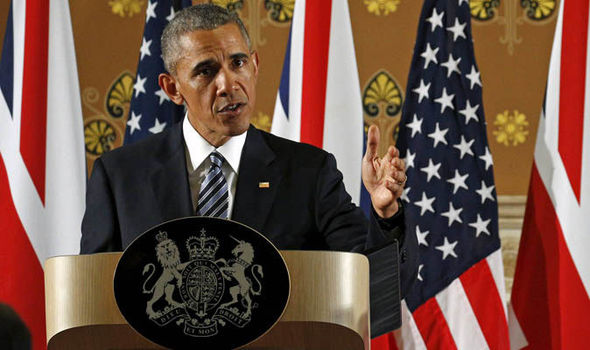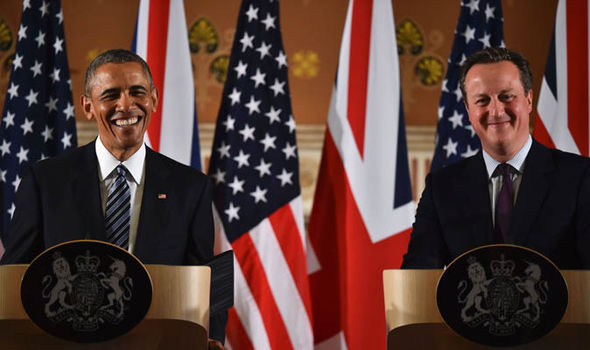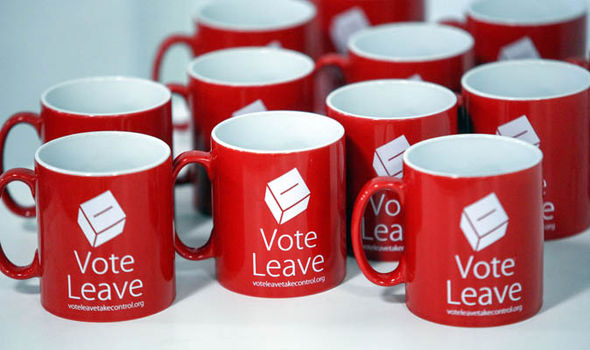Obama’s amazing THREAT to Britain: UK would be at the ‘back of the queue’ after Brexit

BARACK Obama was last night condemned for trying to “blackmail” Britain into remaining in the EU.
The US President warned the UK would be “at the back of the queue” for a trade deal with America if it quit Brussels.
But his threat provoked outrage and scorn from pro-Brexit campaigners, who dismissed it as yet another scaremongering ploy from the pro-EU lobby.
Mr Obama, who will no longer be in office when decisions on a trade deal are made, delivered a lecture to the British people on why he thinks it is in the UK’s, America’s and the world’s best interests for Britain to vote to stay in the EU on June 23.
He weighed into the debate despite being warned by a host of anti-EU campaigners to “butt out” of our referendum battle. He said there could be a US-UK trade agreement “down the line” but warned: “It’s not going to happen any time soon, because our focus is on negotiating with a big bloc, the EU. The UK is going to be in the back of the queue.”
What is good for US politicians is not necessarily good for the British people
Tory Minister Dominic Raab
The claim, made during a joint news conference with David Cameron, angered Leave campaigners.
Tory Justice Minister Dominic Raab said Mr Obama had made “a pretty cynical intervention”.
He added: “We’ve got a lame duck president doing an old friend a favour for purely political reasons – and taking a few unnecessary risks, being a bit irresponsible with the special relationship between our two countries.
“You can’t say on the one hand that the relationship is essential and always will be, then say that if you don’t take my advice you’ll be at the back of the queue for a free trade deal. I don’t think the British people will be blackmailed by anyone but he’s entitled to give his view.
“What is good for US politicians is not necessarily good for the British people. The US would not dream of opening its border with Mexico, so it is hypocritical for President Obama to insist that we do the same with Europe.”
Richard Tice, co-founder of the Leave.EU campaign, said the proposed Transatlantic Trade and Investment Partnership (TTIP) deal between the US and the 28-member EU was not good for Britain.
“We don’t have a trade deal with the US now because we’re members of the EU,” he said.
“The proposed TTIP deal would be disastrous for British workers. Obama doesn’t have the authority to deny us a deal, as he will be long gone before any such proposals are on the table.”

Matthew Elliott, Vote Leave chief executive, said: “Barack Obama won’t be president when we vote to leave so we should take his comments with a large pinch of salt. Of course the US would want to do a deal with its friends in the UK.”
Before the news conference Ukip leader Nigel Farage said Mr Obama had no understanding of the EU and was talking “utter baloney”.
Citing George Bush getting Britain into the Iraq war, and America’s call, resisted by Harold Wilson, to join forces in Vietnam, Mr Farage added: “I would rather he (Obama) butted out.
After all, the history of American foreign policy advice is not good, is it? We can take advice from the Americans on lots of things, but in terms of foreign policy they are rarely right.”
Mr Farage said he hoped all world leaders and global corporations would argue for Britain to stay in the EU because then he could tell voters: “It’s us against the entire political establishment. The more they club together, the better our chances are of winning.”
Pro-Brexit Tory MP Boris Johnson said Mr Obama was being “downright hypocritical” because he “would not dream” of involving America in an organisation like the EU and surrendering so much control over its own affairs. During the news conference Mr Obama stressed it was the British people’s decision whether to leave the EU.
But he said he believed it was right to make the case that Britain, and therefore its close ally America, was stronger, safer and more prosperous when the UK was a strong member of a stable EU.
He said the US and UK might well have a special relationship but it was inefficient to try to do piecemeal trade deals rather than devoting the effort involved to a deal with a big market of many countries.
He acknowledged the US had different relationships with its neighbours. But he added: “If I had access to a massive market where I sell 44 per cent of my exports and I’m thinking about leaving the organisation that gives me access to that market… that’s not something I would probably do.”
EU membership also gave Washington a trusted partner in Europe on issues such as terrorism, he said. “The US wants a strong United Kingdom as a partner and the UK is at its best when it is helping to lead a strong Europe. I don’t believe the EU moderates British influence in the world, it magnifies it, makes you guys bigger players.”
Mr Cameron also stressed that the referendum was “the sovereign choice of the British people” but said it made sense “to listen to what our friends think”.
Meanwhile, Leave campaigners highlighted the US embassy’s longstanding refusal to pay the congestion charge for driving in central London. Mr Elliott said: “The US zealously defends its sovereignty, even to the point of refusing to pay the congestion charge, yet the US President thinks the UK should hand more power over our affairs to Brussels and EU judges.”
Ukip trade spokesman the Earl of Dartmouth said a US customs official had confirmed by email that the UK was not too small to do a trade deal with the US.
“A deal is in both countries’ interests and President Obama’s comments strike me as pre-scripted political point scoring rather than a statement of fact,” he said.
Политика конфиденциальности | Правила пользования сайтом









